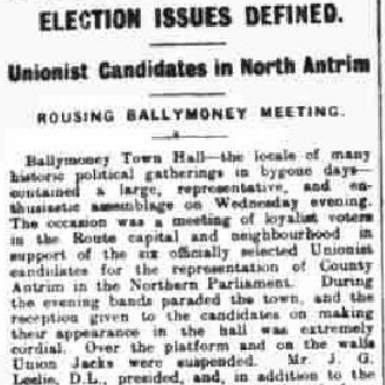Unionist Meeting at Ballymoney Town Hall
19 May 1921

Ballymoney Free Press, 19 May 1921
In the run-up to the Northern Ireland general election, Unionist candidates held a public meeting in Ballymoney Town Hall. The Chairman praised James Craig as ‘the embodiment of the loyalty of Ulster’, encouraged attendees to vote for Unionist candidates, and explained the single transferable voting system. The candidates then addressed the audience and the meeting ended with the British national anthem. Unionist candidates won 6 of the 7 Antrim seats and the remaining seat was taken by Nationalist candidate Joseph Devlin.
Election Issues Defined. Unionist Candidates in North Antrim. Rousing Ballymoney Meeting.
Ballymoney Town Hall – the locale of many historic political gatherings in bygone days – contained a large, representative, and enthusiastic assemblage on Wednesday evening. The occasion was a meeting of loyalist voters in the Route capital and neighbourhood in support of the six officially selected Unionist candidates for the representation of County Antrim in the Northern Parliament. During the evening bands paraded the town, and the reception given to the candidates on making their appearance in the hall was extremely cordial. Over the platform and on the walls Union Jacks were suspended …
The Chairman, in introducing the speakers, said he was heartily glad that so many of the electors were present to join in declaring once more their adherence to the old cause, and in giving a hearty welcome to the six candidates who were to serve “in the front line” during the approaching days. (Applause.) Again and again that hall had been used at election times for the purpose of declaring their loyalty and of urging support for various candidates. Many years had passed since the hall was first used for that purpose, and they had brought their changes. It was in consequence of one of those changes that they had assembled that evening to promote, not as formerly the election of one candidate for North Antrim division, but the election of six candidates, who were to serve the whole county.
Those candidates had been selected by a body which was representative of every shade of loyalist opinion throughout the county, and composed of delegates who were chosen by the electors themselves, and at no hole-and-corner meeting, but at open meetings, publicly advertised, which every loyalist man or woman had the opportunity of attending …
Every man and woman must go to the poll on the 24th May. To secure the six seats they required to poll not by hundreds, not even by thousands, but by tens of thousands … They must remember, and try to impress on their friends who were not with them that evening, that this might be their last chance to maintain not only for themselves, but for those who would come after them, a position which had been won after years of struggle. They must not abandon that position, because the alternative was submission to a so-called Parliament in Dublin, where their enemies, the enemies of Ulster and the Empire would be in an overpowering majority …














